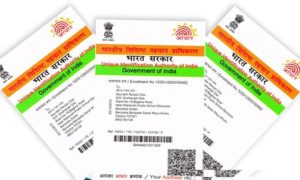Tax under New Tax Regime: The Centre in its last full Budget, presented on February 1, 2023, introduced a few crucial changes in the taxation system. The primary one was making the New Tax Regime the new default tax system for taxpayers in place of the Old Tax Regime.
Read More: Aadhaar Card No Longer Valid Document For Date Of Birth Proof For EPFO
The Finance Ministry introduced additional tax advantages under the New tax regime to attract more taxpayers. These additional tax benefits were announced in the Budget 2023 and came into effect on April 1, 2023, for the fiscal year 2023-24.
Under the Old Tax Regime, there were numerous tax deductions and exemptions offered under different sections of the Income Tax Act. These included deductions for House Rent Allowance (HRA), Leave Travel Allowance (LTA), standard deduction, education or hostel allowance for children, professional tax, and home loan interest under Section 24, and others.
Whereas under the New Tax Regime, taxpayers cannot claim several exemptions and deductions, such as HRA, LTA, 80C, 80D and more. It is to be noted that salaried individuals can claim two deductions under the new tax regime — Standard Deduction and deduction under section 80CCD (2) for employer’s contribution to National Pension System (NPS).
Here’s how one can claim tax deductions for NPS under old and new income tax regimes:
New Tax Regime: The NPS-related deduction under Section 80CCD (2) of the Income-tax Act, 1961, was allowed under the New Tax Regime. Under this regime, the deduction is on the employer’s contribution to the employee’s NPS account. Section 80CCD(2) applies to only salaried individuals and not to self-employed individuals. The deductions under this section can be availed over and above those of Section 80CCD(1).
Section 80CCD(2) allows a salaried individual to claim the following deduction:
Central Government or State Government Employer: Up to 14 per cent of their salary (basic + DA)
Any other employer: Maximum deduction of 10 per cent of salary (basic + DA)
Read More: What Documents Are Required to Open a Savings Account?
Under the updated tax regulations, individuals can avail the advantage of employer contributions to their National Pension System (NPS) account as per Section 80CCD(2) of the Income Tax Act. This deduction is limited to the employer’s NPS contributions made on behalf of the employee, up to 10 per cent of the employee’s salary (Basic + DA).
“Additional Tax Benefit is available to Subscribers under Corporate Sector, under section 80CCD (2) of Income Tax Act. Employer’s NPS contribution (for the benefit of employee) up to 10 per cent of salary (Basic + DA), is deductible from taxable income, up to 7.5 Lakh,” the NPS website says.
There is no tax benefit on investment towards a Tier II NPS Account.
Old Tax Regime: Taxpayers going with the Old Tax Regime can claim tax deductions against NPS under three sections of the Income-tax Act, 1961: Sections 80CCD (1), 80CCD (1B), and 80CCD (2).
Under the Old Tax Regime, Section 80CCD (1) of the Income-tax Act, 1961, a deduction from taxpayers’ gross total income for contributions made to the NPS is allowed. Both salaried and self-employed taxpayers can avail of the deduction under Section 80CCD(1). The maximum deduction under this section is — 10% of your salary (Basic + DA) for salaried individuals or 20% of gross total income for self-employed. The upper limit is Rs 1.5 lakh in a financial year.
One should note that the total deductions under section 80C, section 80CCC and section 80CCD should not exceed Rs 1.5 lakh.
Section 80CCD (1B) offers an additional deduction of up to Rs 50,000 for contributions to NPS, which is over and above the limit of Rs 1.5 lakh available for taxpayers under Section 80CCD (1).
Read More: Bank Holiday 2024: Banks To Remain Shut Today In These Two States; Check List Here
Section 80CCD (2) specifically applies to the employer’s contribution towards an employee’s NPS account. Consequently, this benefit is exclusively accessible to salaried taxpayers. In certain cases, employees in the private sector may have the opportunity to modify their salary structure to include employer contributions to NPS, which are deducted from their overall cost-to-company (CTC) package.





































